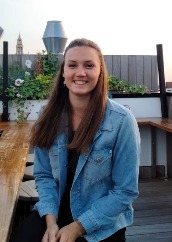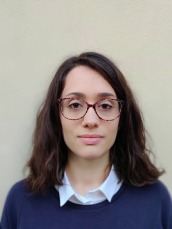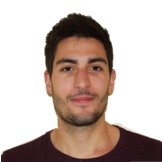YAG PhD-projects 2020

Anna Langener
Using multimodal data to understand the social environment and its ef ect on wellbeing
Supervisors: Laura Bringmann (BSS – Psychological Methodology) and Gert Stulp (BSS – Sociology).
The project focuses on tools from different disciplines that are currently used to capture people’s changing social context over time. Namely, experience sampling methods (ESM), repeated egocentric networks, and passive smartphone measures. The PhD project takes place in three departments (from BSS psychometrics and sociology, and GELIFES within FSE).
During the first year, we have been working on a systematic review that synthesizes the literature on how those different methods arising from different disciplines are used to capture the social environment in relation to well-being.
In collaboration with other researchers, we collected data in two student samples (2021, 2022) to empirically investigate how those three methods can be combined with each other.
We are currently finalizing a manuscript titled “It’s all about timing: Exploring the consequences of choosing different temporal resolutions for analyzing digital phenotyping data”. In this manuscript, we address various time-related decisions researchers face when analyzing passive measures. We highlight with several cases how choosing different time scales can lead to different substantive conclusions. Finally, we propose to investigate the consequences of choosing different temporal resolutions by doing a multiverse analysis. Preliminary results of this manuscript have been presented during symposiums of different conferences (Society for Ambulatory Assessment, International Meeting of the Psychometric Society, and Congress of the German Psychological Society).
We also started working on a third project which focuses on how accurately we can predict mood using individualized machine learning models based on the social environment as measured through digital phenotyping, ESM, and ego-centric networks. Combining three methods allows us to objectively capture the behavior of a person (via digital phenotyping), as well as subjectively assess the interaction quality (via ESM), and relationship characteristics (via egocentric networks). We examine how much each of those three methods adds to predicting mood and assess the overlap between the different methods. This helps to identify the most important measurements in predicting health outcomes.

Silvia Stopponi
The application of Natural Language Processing to ancientGreek, in particular on the use of language models to study the Semantics of ancient Greek words and to detect semantic change
Supervisors: Saskia Peels (Arts - Theoretical and Empricial Linguistics) and Malvina Nissim (Arts - Computational Linguistics)
The aim of the project is the study of ancient Greek Semantic change by using Machine Learning, and the building of an interface that Classicists can use to consult language models trained on ancient Greek. In the first year a review of the state-of-the-art was produced and word embedding models were trained on a corpus of ancient Greek. Word embedding models are Machine Learning systems that learn from probabilities of word co-occurrences in a collection of texts, by assigning a vector (word embedding) to each word. From such embeddings it is possible to extract linguistic information, and the first results showed that embeddings trained on ancient Greek return usable information, consistent with the existing literature about ancient Greek Semantics.
The following step was collecting data to build a benchmark for the evaluation of word embeddings of ancient Greek, the first built from expert judgements, that will be published open-access and will produce a publication. A collateral project produced an open-access resource, a lemmatizer for ancient Greek inscriptions, presented at the Language Resources and Evaluation Conference (2022), producing a publication, and at the Congressus Internationalis Epigraphiae Graecae et Latinae (2022).
During the first two years of her PhD Silvia developed her programming skills and gained knowledge about Computational Linguistics and ancient Greek religion, for example by attending conferences and by participating in the course Sanctuaries and the Sacred, held in Greece in 2021, and in the course of Greek Epigraphy (2021 – 2022). She gave three guest lectures for students of the University of Groningen and a guest lecture at the Christelijk Gymnasium of Utrecht. She was a speaker at the Katwijk Conference (2022) and at the International Conference of Ancient Greek Linguistics (2022). This second paper will be published. She was part of the organization of the workshop Computational Approaches to Ancient Greek and Latin, held in November 2021 at the University of Groningen in the context of the YAG PhD project, to gather scholars pioneering this research field. The workshop, a second edition of which, always organized by our group, will be held in 2023, allows us to make new contacts with scholars working in Digital Classics and Computational Linguistics in other countries.
Finally, there is an ongoing collaboration between us, dr. Barbara McGillivray (King’s College, London) and drs. Nilo Pedrazzini (The Alan Turing Institute). A paper co-written with them has been presented at the International Conference on Historical Linguistic (2022) and will produce a publication.
There is not much update in the project since last June, because Silvia was in maternity leave between half July and half November.

Panagiotis Kelefiotis Stratidakis
Supervisors: Sahar el Aidy (FSE – GBB) and Shirin Faraji (FSE - ZIAM).
I am Panagiotis Kelefiotis Stratidakis, a third year bursary Ph.D. student supported by the YAG scholarship for interdisciplinary projects. We are bringing together the experimental group of Sahar El Aidy (Host Microbe Interactions) with the theoretical group of Shirin Faraji (Theoretical and Computational Chemistry) in an effort to further investigate Parkinson’s Disease. Our goal is to study how the gut microbiome, and more specifically the bacterial protein tyrosine decarboxylase (TDC), can interfere with the current commercially available medication.
During the first part of my project, we performed animal pharmacokinetic experiments, using different concentrations of the commercially available inhibitor, carbidopa (CD), to test its effectiveness on different gut microbial variations. The great variation of enzymatic activity among the samples collected, lead to a need for better established analytical method. The troubleshooting which was performed, will allow us now to further continue the in vitro studies.
Furthermore, a better understanding of the inhibition mechanism was required, and was performed in the second part of the project. In the in silico part of this study, which took place in the Theoretical and Computational Chemistry group, we performed molecular dynamics studies on the human and bacterial enzymes. The binding of the cofactor, pyridoxal phosphate (PLP), was analyzed in both cases. The inhibition that takes place on the human enzyme, dopa decarboxylase (DDC), through the binding of CD to PLP is being compared with the interactions that PLP has in the active site of TDC. After finalizing this study, we expect to suggest a potential inhibition mechanism for the TDC enzyme. We have presented this study in two conferences (Zernike Vlieland meeting 2022, and NWO CHAINS, Eindhoven 2022).
The upcoming steps for this project are to eventually return to the wet lab, and combine the knowledge obtained from the in silico studies, along with directed evolution experiments.This will allow us to cross validate the examined data received from the molecular dynamics studies as well as to better understand the parameters that are causing the interference of TDC to the Parkinson’s disease treatment.

Tabea Hoffman
Fostering pro-environmental behaviour inneighbourhoods by managing social norms
Supervisors: Ward Rauws (Spatial Sciences) and Jan-Willem Bolderdijk (FEB – Marketing).
Stefan Sliwa
Political decisions and their consequences for social and regional cohesion
Supervisors Lukas Linsi (Arts) and Milena Nikolova (FEB); promotor Viola Angelini (FEB, non-YAG)
Marrying theories from various social sciences (e.g. political science, sociology, and public health) with methodological techniques from economics, the project examines how political decisions affect cohesion in municipalities. The interdisciplinary projects leverage large-scale administrate data and nationally-representative household surveys to investigate how countries are internally diverging on key outcomes, such as health, political participation, and civic engagement. The project studies such dynamics in societies in the Global North (Europe) and South (Brazil). The first project concerns increasing political apathy and frustration in France, and the role of the government's decision to ignore a popular referendum in 2005 within this context. The second and third projects will consider how an international dispute between Cuba and Brazil led to the exit of thousands of Cuban doctors from vulnerable Brazilian municipalities, and how this sudden exit impacted local health and political outcomes. The last project will investigate the interrelationship between an increasingly mechanized workforce and civic and political engagement in European societies.
The first project will be presented at international conferences this summer. The second and third project are well under way (with some preliminary findings). Stefan may be able to undertake field research in Brazil as a visiting researcher at Fundação Getulio Vargas during the coming academic year.
| Last modified: | 09 July 2024 4.34 p.m. |
